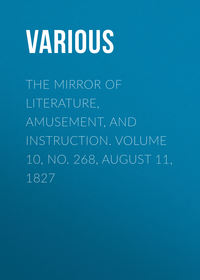Kitabı oku: «The Mirror of Literature, Amusement, and Instruction. Volume 10, No. 268, August 11, 1827», sayfa 3
Various
Bir şeyler ters gitti, lütfen daha sonra tekrar deneyin
Türler ve etiketler
Yaş sınırı:
12+Litres'teki yayın tarihi:
14 eylül 2018Hacim:
50 s. 1 illüstrasyonTelif hakkı:
Public Domain